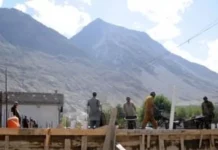
NEW DELHI: National Minorities Commission Chairman Wajahat Habibullah today criticized former army chief V K Singh for taking to streets against the gang rape of a girl here asking whether allegations of rape against personnel of the force in Jammu and Kashmir have ever been enquired into.
A former IAS officer of the Jammu and Kashmir cadre, who was also the first Chief Information Commissioner of the country, said a productive way would have been if people like Gen Singh would have advised the government on dealing with such a situation.
“In his (Gen Singh’s) case, I am sorry to say so he was Commander-in-Chief of the army. There are, at least in the state of Jammu and Kashmir, massive allegations of rape against army. Were they ever enquired into? Was an effort made to bring justice? Here was a case of rape. Regrettable, yes.
But if he wants to join in condemnation of the government against that, has he taken into account various ramifications of that,” Habibullah told PTI in an interview.
He said it could be possible when Singh was the army chief he was not able to remedy the cases although he may have wanted to.
But that was even more reason to go to the Prime Minister, the Home Minister and tell them how to handle it, he added.
Habibullah said that things have changed during the last two decades and army had tried to reach out to people of Jammu and Kashmir but there exists a basic mistrust.
“The basic mistrust is because general transparency and accountability is not there. If something goes wrong, if there is rape then machinery should come into automatic activation.
Like they would like the Delhi Police to have done, surely the army such being a disciplined force should automatically go into action about bringing to book any person responsible for that,” he said, adding if allegations are false then those facts should also be made public. Habibullah said rejecting allegations on the grounds that it would demoralize the force does not help in winning public trust.
“Don’t say we don’t agree and this would demoralize the army. Do you have any proof of that, have you ever enquired into that? If you do this, then you don’t win the public trust and basically the job of the government, the army and others, in a democracy at least, is to win the public trust,” he said.
On the question whether people who have held sensitive positions in government should join street protests, Habibullah said, “For people who have been holding such positions it should be possible for them to reach the government itself and advice. I would think that is a more productive way.
“If they see strength in the protests, based on their own experience, surely the better way is not necessary to join the protests but to bring to the notice of the government how can it improve its functioning.”
He said in a democracy there is a healthy mistrust between the Government and the public where the public does not believe whatever is told to them and Right to Information is a tool to bridge that mistrust.
“But what has happened recently that huge demonstrations on the street. If you ask me why this has happened? A simple answer to this is deep mistrust. The government is saying I am doing this but people just don’t trust the government to do it. Although they (government) are saying of doing it. They are doing it but still people are coming on streets,” he said.
He said Right to Information was a tool to build that trust as one can always check whether whatever government was saying was correct.
“That is not the attitude yet. And that is sad because now we have seven years of the RTI and by now this attitude, at least in the urban centre, at least in the capital should have started happening,” Habibullah said. -PTI





